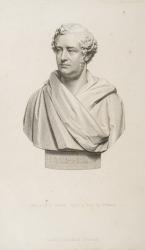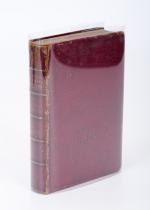Tupper, Proverbial Philosophy.
Proverbial Philosophy.
Thirty-fifth Edition. London, Hatchard and Co., 1859. Octavo. Frontispiece – steel-engraving of a bust showing Martin Tuppper, 385 pages. Hardcover / Original, decorative full morocco with gilt lettering to spine. In protective collector’s Mylar. Some children’s writing to frontcover. Slightly rubbed binding. Overall in very good and firm condition with only minor signs of external wear. Edges gilt. Small stain to edge.
Martin Farquhar Tupper (17 July 1810 in London – November 1889 in Albury, Surrey) was an English writer, and poet, and the author of Proverbial Philosophy. Martin Farquar was the eldest son of Dr. Martin Tupper (1780–1844), a medical man highly esteemed in his day who came from an old Guernsey family, by his wife Ellin Devis Marris (d. 1847), only child of Robert Marris (1749–1827), a landscape painter (by his wife Frances, daughter of the artist Arthur Devis).
Martin Tupper received his early education at Charterhouse. In due course he was transferred to Christ Church, Oxford, where he took his degree of B.A. in 1832, of M.A. in 1835 and of DCL in 1847. At Christ Church, as a member of the Aristotle Class, he was a fellow student with many distinguished men, including the Marquess of Dalhousie, the Earl of Elgin, William Ewart Gladstone and Francis Hastings Doyle.
Having taken his degree of M.A., Tupper became a student at Lincoln’s Inn and was called to the Bar in the Michaelmas Term, 1835. However, he did not ever practice as a barrister. In the same year he married his first cousin once-removed Isabella Devis, daughter of Arthur William Devis, by whom he was to have four sons and four daughters. About the same period Tupper’s literary career commenced. He contributed to the periodicals of the day, but his first important essay in literature was a small volume entitled Sacra Poesis.
Albury History Society lists publications, sound recordings including a biographical talk by Tupper’s grandson (invented fountain pen, safety horseshoe, instant tea, bulletproof tunic, steam driven paddle boat; predicted air travel, pioneered foundation of Liberia for freed slaves, formed Volunteer Corps, proposed tunnel to Isle of Wight, insisted first Morse code message through transatlantic cable was religious; moved to Crystal Palace shortly before death) and references to Tupper’s life.
In 1837 the first series of Proverbial Philosophy appeared, long series of didactic moralising composed in a lawyer’s chambers in Old Square, Lincoln’s Inn, during part of the previous year. Tupper had been encouraged to publish by Henry Stebbing.[3] A typical example is: “Well-timed silence hath more eloquence than speech”. His work met at first with moderate success in Britain, while in the United States it was almost a total failure. It slowly picked up steam, however. Over the next thirty years, by 1867, it passed through forty large editions in Britain, while nearly a million copies were sold in the United States. His blank verse is essentially prose cut up into suitable lengths; but Proverbial Philosophy contained apt and striking expressions and appealed to a large section of the public.
In 1839, Tupper published A Modern Pyramid to commemorate a Septuagint of Worthies, being sonnets and essays on seventy famous men and women; in 1841 An Author’s Mind containing skeletons of thirty unpublished books; in 1844, The Crock of Gold, The Twins, and Heart tales illustrative of social vices, and which passed through numerous editions; in 1847, Probabilities, an Aid to Faith, giving a new view of Christian evidences; A Thousand Lines, Hactenus, Geraldine, Lyrics, Ballads for the Times, Things to Come, A Dirge for Wellington, Church Ballads, White Slavery Ballads, American Ballads, Rifle Ballads, King Alfred, a patriotic play; King Alfred’s poems, translated from Anglo-Saxon into corresponding English metres. In 1856, Paterfamilia’s Diary of Everybody’s Tour, The Rides and Reveries of Æsop Smith, and Stephan Langton a biographical novel, which sought, with much graphic painting to delineate England in the time of King John. He also published Cithara, a collection of Lyrics; Three Hundred Sonnets, A Phrophetic Ode and many other fugitive pieces, both verse and prose which appeared in various newspapers and magazines. In 1886, he published My Life as an Author. In 1845 Tupper was elected a Fellow of the Royal Society. He received the gold medal for science and literature from the King of Prussia.
A genial, warm-hearted man, Tupper’s humane instincts prompted him to espouse many reforming movements; he was an early supporter of the Student Volunteer Movement, and did much to promote good relations between Britain and America. He tried to encourage African literature and was also a mechanical inventor in a small way. Critic Kwame Anthony Appiah, however, has used a quote from Martin Tupper’s ballad “The Anglo-Saxon Race” 1850 as an example of the predominant understanding of “race” in the nineteenth century. Tupper’s ballad appeared in the journal The Anglo-Saxon containing the lines: “Break forth and spread over every place/The world is a world for the Anglo Saxon race!″
At the end of his life he vanished into obscurity, despite the words on his grave-stone in Albury churchyard: “Although he is dead, he will speak.” (Wikipedia)
- Keywords: Catalogue No.10 – International Literature · Catalogue No.7 – Religion · Catalogue Ten – International Literature · English Literature · English Literature – Rare · English Poetry · Philosophy Rare · Poetry – Rare · Proverb · Proverbs · Religion – Rare
- Language: English
- Inventory Number: 110279AB
EUR 68,--
© 2025 Inanna Rare Books Ltd. | Powered by HESCOM-Software















